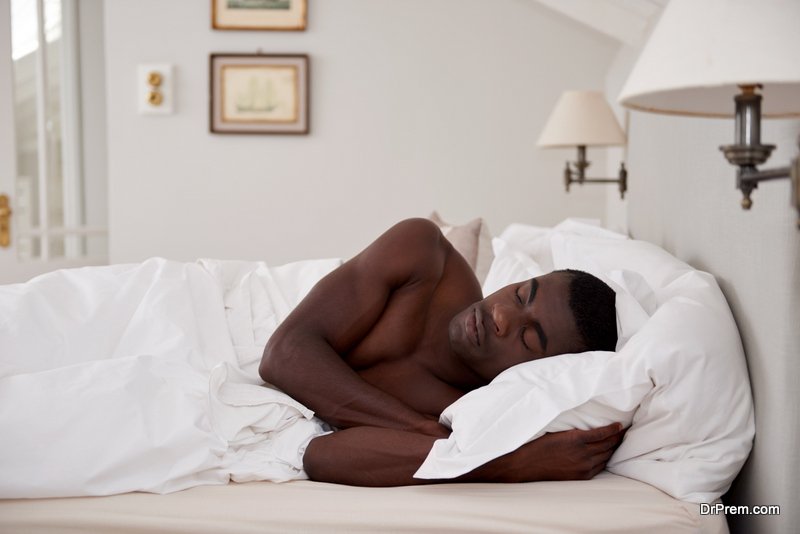Nearly 35% of American adults are not getting the recommended 7 hours of sleep per night. That equates to 1 in 3 people who are struggling through their day disorientated, unfocused, and fatigued. Sleep is when your body recovers and repairs itself. Quality sleep is needed for your body to perform properly, both mentally and physically. If you’re struggling to get a quality night’s sleep but can’t understand why, keep reading. Here you’ll learn 8 ways to improve your sleep and finally feel rested.
1. Create a Healthy Sleep Routine
 We are creatures of habit. Our bodies thrive on routine. Which is why creating a sleep routine is one of the best ways to get a quality night sleep. Your body adopts a natural sleep-awake cycle. Your mind shifts and changes when it knows that sleep time is near. This shift is made easier by going to bed at the same time each night. The same goes for waking up in the morning. Setting your alarm for the same time each morning will help get your body into a healthy routine. Though it’s difficult, don’t sleep in too late on the weekends or stay up too far past your bedtime. This can interrupt your sleep-wake cycle come Monday morning.
We are creatures of habit. Our bodies thrive on routine. Which is why creating a sleep routine is one of the best ways to get a quality night sleep. Your body adopts a natural sleep-awake cycle. Your mind shifts and changes when it knows that sleep time is near. This shift is made easier by going to bed at the same time each night. The same goes for waking up in the morning. Setting your alarm for the same time each morning will help get your body into a healthy routine. Though it’s difficult, don’t sleep in too late on the weekends or stay up too far past your bedtime. This can interrupt your sleep-wake cycle come Monday morning.
2. Avoid Certain Food and Drink
Indulging in eating certain foods and drinks before bed can make it nearly impossible for your body to achieve sleep. The two biggest beverage culprits for interrupted sleep are alcohol and caffeine. It’s no secret that caffeine is a natural stimulant. After all, it’s what millions of people turn to start their day. Drinking caffeinated drinks too close to bedtime will prevent your body from entering the state of relaxation needed for sleep. While alcohol makes you drowsy at times, once these effects wear off, it actually acts as a stimulant as well. Avoid eating heavy or rich foods right before bed, or too much food. This can lead to an upset stomach, heartburn, and gas, keeping you up or waking you up throughout the night.
3. Get Comfortable
 If you’re body isn’t comfortable, how can you sleep? People complain of “tossing and turning” during the night as they struggle to find a comfortable sleep position. Try different positions including lying flat on your back or on one side or the other. Comfort usually starts with a quality mattress and supportive pillow. Some people need a firmer mattress or pillow while others prefer something softer. If you’re experiencing neck or back pain during the night, a chiropractor can help. It may take you a few tries to find the right sleep position and the perfect mattress or pillow for your individual needs.
If you’re body isn’t comfortable, how can you sleep? People complain of “tossing and turning” during the night as they struggle to find a comfortable sleep position. Try different positions including lying flat on your back or on one side or the other. Comfort usually starts with a quality mattress and supportive pillow. Some people need a firmer mattress or pillow while others prefer something softer. If you’re experiencing neck or back pain during the night, a chiropractor can help. It may take you a few tries to find the right sleep position and the perfect mattress or pillow for your individual needs.
4. Put the Electronics Away
We’re all guilty of watching television before bed, reading on our Kindle, or scrolling through social media on our phones. But this is one of the worst things you can do before trying to go to sleep. That’s because all of these electronics emit a certain type of light known as blue light. Blue light prevents your brain from releasing melatonin, the chemical needed to achieve sleep. Try avoiding all electronics at least 2 hours before bed. Swap out your Kindle for a paper book. Read a magazine instead of Facebook and try listening to calming music rather than watching TV. You’ll be surprised at how easily you fall asleep once your ditch the electronics.
5. Don’t Bring Outside Stress into the Bedroom
 Stress is one of the leading causes of missed sleep. All too often people bring their work to bed or other issues from the day. Your bedroom should be an oasis of calm and comfort. Try reserving your sleep space as simply that — a place for rest and relaxation. Creating a calming environment in your bedroom is key in achieving quality sleep. Invest in room darkening shades that prevent outside light from creeping in. Buy a sound machine that offers calming, sleep inducing sounds. Some people even remove televisions from their room, to avoid the temptation of watching TV before bed. Think of the most comfortable, relaxing environment possible, and bring those elements into your bedroom.
Stress is one of the leading causes of missed sleep. All too often people bring their work to bed or other issues from the day. Your bedroom should be an oasis of calm and comfort. Try reserving your sleep space as simply that — a place for rest and relaxation. Creating a calming environment in your bedroom is key in achieving quality sleep. Invest in room darkening shades that prevent outside light from creeping in. Buy a sound machine that offers calming, sleep inducing sounds. Some people even remove televisions from their room, to avoid the temptation of watching TV before bed. Think of the most comfortable, relaxing environment possible, and bring those elements into your bedroom.
6. Skip Naps
We’ve all hit that afternoon wall. Lunchtime is over but the workday isn’t and you’re falling asleep at your desk. Most of us reach for coffee or another stimulant to get through the day. Others, when possible, take a cat nap or afternoon snooze. This short nap could be stopping you from falling asleep at night. Whenever possible, skip the nap. Try taking a brisk walk, getting some fresh air, or even striking up a conversation with a friend. In short do anything to distract you from sleep and keep you from dozing off.
7. Exercise
 Exercise benefits the body in so many ways, and achieving a good night’s sleep is one of them. Exercise energizes you during the day, and makes sleep a welcome reprieve at the end of the night. Whenever possible, start your day with exercise. Avoid exercising too close to the end of the day where it may wake your body up instead of help you rest.
Exercise benefits the body in so many ways, and achieving a good night’s sleep is one of them. Exercise energizes you during the day, and makes sleep a welcome reprieve at the end of the night. Whenever possible, start your day with exercise. Avoid exercising too close to the end of the day where it may wake your body up instead of help you rest.
8. Fall Back Asleep Easier
The average adult wakes up 5 times per night. Individuals over 60 usually get up out of bed at least once to use the bathroom. And some people may wake briefly over 100 times per night! Interrupted sleep is one of the biggest causes of daytime drowsiness. But there are ways to more easily fall back to sleep after waking in the middle of the night. Try turning off your thoughts. The premise behind counting sheep for sleep is to help drown out other thoughts that keep you awake. Try focusing on relaxing versus sleep. When you place too much focus on going to sleep, your mind becomes consumed and may actually drive sleep away. Get up and get yourself a drink of water or glass of warm milk. Avoid turning on the television, checking your cell phone, or engaging in any type of stimulating behavior.
A final note
We all deserve a quality night’s sleep, but we don’t always get one. So many external factors can affect how well you sleep, if you experience broken sleep, or keep you from falling asleep. Try adopting a healthy sleep routine using some of these tips and you’ll feel rested and rejuvenated before you know it.
Article Submitted By Community Writer




